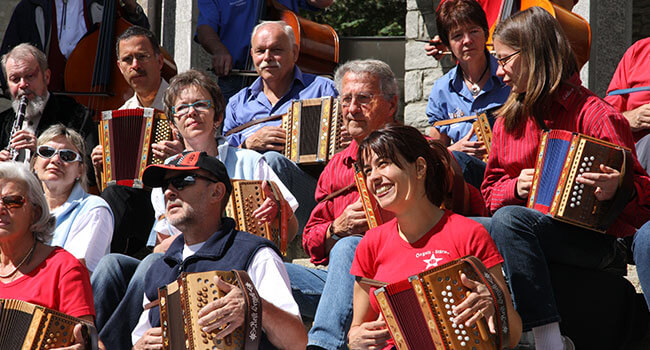Switzerland Rich Culture and Traditions

Hi friends, welcome to my new article about the culture and tradition of switzerland. The Switzerland's name originates from Schwyz, one of the three founder cantons. The name Helvetia derives from a Celtic tribe called Helvetians that settled in the region in the second century B.C. Switzerland is a patchwork of small regions that gradually joined the confederation not because of a shared identity but because the confederation appeared to guarantee their independence. The culture, customs and tradition differ in different region of the country.
Below is the details about the people, cusine, festivals, language and overall culture and traditions of switzerland.
Language: Switzerland is a federation of twenty-six states called cantons (six are considered half cantons). There are four linguistic regions: German-speaking (in the north, center, and east), French-speaking (in the west), Italian-speaking (in the south), and Romansh-speaking (a small area in the southeast). This diversity makes the question of a national culture a recurring issue.The swiss culture is distinguished by its diversity, as the country lies at the crossroads of several outstandind European cultures. It is also a multilingual country, as its national languages include German,French, Italian and Romansh. In little Switzerland, four national languages are spoken in addition to numerous dialects.

People: It is a diverse country with a wide range of traditional customs. Switzerland is far richer in culture and traditions than the typical chocolate, cheese and luxury watches that tourists love. To truly feel at home in a country, expats often try to immerse themselves in the culture of their new country and there is no better way than getting to know Swiss tradition and participating. Today, Switzerland is a quiet, sober, often thrifty, leave-me-alone type of country. It is renowned for its colourful landscapes and fervent dancing, but also excellent hiking, trekking and ski trails. Nowadays, mountain areas of Switzerland have a strong skiing and mountaineering culture, and are associated with folk arts such as alphorn and yodeling.

Culture: The culture of the small Alpine nation of Switzerland is heavily influenced by the cultures of its neighboring nations of France, Italy, and Germany. This is evident in the fact that the major languages of these three countries, namely, French, Italian, and German serve as three of the four official languages of Switzerland (Romansh being the fourth one).
The Swiss have always observed and nurtured their local customs, which has Switzerland to become a country with an extremely wealthy cultural activity and living tradition.
Switzerland is a country with an enormous wealth of cultural activity and living tradition.
This was because it is not uniformity, but variety in a small space that defines Switzerland. This can be explained culturally and geographically.
This was because it is not uniformity, but variety in a small space that defines Switzerland. This can be explained culturally and geographically.
Religion and festival: The federal state of Switzerland has no state religion. The majority of the population of the country are Christians. The festivals celebrated in Switzerland differ considerably depending on the season and the region. Some are based on ancient traditions while others have emerged only recently. Many of them reflect the course of the agricultural year, such as the ringing in of the vineyard workers in spring, the Alpine ascent and descent during the summer months, and the wine festivals, the Chästeilet ch
Other celebrations recall historical events such as important victories in historical battles.
Swiss Cuisine: Traditional Swiss dishes are made of simple ingredients and are regionally influenced by Italian, German, and French cuisines. There are a few dishes and specialities, such as fondue, Alplermagronen and chocolate, that are typical of Switzerland, but there is no real Swiss cuisine to speak of. The food in Switzerland is a potpourri of influences from various countries. It combines the cuisines of its neighbours and creates from them a local cuisine with local ingredients. Regional and local culinary specialties generally are based on a traditional type of cooking, rich in calories and fat, that is more suited to outdoor activity than to a sedentary way of life. Dairy products such as butter, cream, and cheese are important parts of the diet, along with pork. More recent eating habits show a growing concern for healthy food and a growing taste for exotic food.

The Swiss have always observed and nurtured their local customs, which has Switzerland to become a country with an extremely wealthy cultural activity and living tradition.Many factors contributed to the formation of the Swiss culture and its customs. It is crucial, however, to mention the Alps. This mountain range played the main role in shaping the minds of the inhabitants in this region, including their rationality, conservatism (generally typical for both mountains and islands)
Switzerland, with its cultural life and traditions, attracts more and more tourists every year. If you like combining discoveries with beautiful nature, then Switzerland is the right place to start from.
So friends, I hope you enjoyed my article about the culture and tradition of switzerland. Stay safe, stay healthy. Thanks.

Comments
Post a Comment